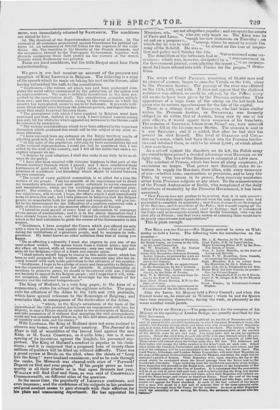The corps of Count PAULEN, consisting of 20,000 men and
84 pieces of cannon, began to pass the Vistula on the 13th, close to the Prussian frontier. The passage of the river was effected on the 13th, 14th, and 15th. It does not appear that the slightest resistance was offered, or could be offered, by the Pelts ; every aid seems to have been given by the Prussian authorities. This appearance of a large force of the enemy on the left bank has given rise to serious apprehensions for the fate of the capital. There is a strange story of GIELGUD, who had taken shelter within the Prussian frontier, as DMVERNICK i was formerly obliged to do within that of Austria, being shot • by one of his own officers, it would appear from suspicion of his treachery_ The remains of GIELGUD, letters from Memel say, were interred. where he fell in the bivouac near Stettin. The assassin is said to b one Snut.syci ; • and it is added, that after lie had shot his aeneral he shot himself. The total of GIELGUD and CHLA- powsm's corps, which had been driven into the Prussian territo- ries and detained there, is said to be about 2,500; of which about
1,000 were horse. .
As a set-off against the disasters on its left, the Polish army are stated to have gained a decided advantage over Runtomt on its right wing. The loss of the Russians is estimated at 3,000 men.
The conduct of Prussia, which has been all along suspicious, suspicious no longer. That power now distinctly states its in- tention to supply the Russians, their allies, with every necessary of war—whether arms, ammunition, or provisions, and to keep the Poles, by every means in its power, from receiving assistance, either from Prussian subjects or any other. To the remonstrances of the French Ambassador at Berlin, who complained of the daily infractions of neutrality by the Prussian Government, it has been answered, "That Prussia does not profess to be neutral, that it is only passive; that the Polish diplomatic agents abroad were the only persons who had pretended to establish its neutrality ; that it was desirous to see the triumph of the Russians, and the overthrow of the Poles ; that it would employ all the means of bringing:about this result, short of fighting; that it considered
the Poles only as insurgents against their lawful Sovereign, who was the close .ally of Prussia ; and that every means of reducing them would have its hearty concurrence and approbation."
This is plain enough.


























 Previous page
Previous page